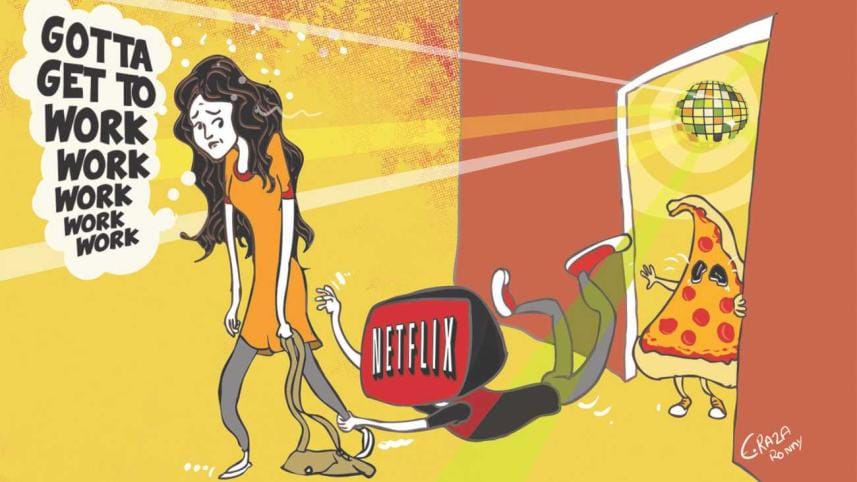The ultimate guide to [stressing over] a job after graduation

It is no happy coincidence that my return to full time employment and my second foray into writing began at the same time. They say misfortune never comes alone, and indeed, a dangerously low bank balance and an old-friend-turned-new-editor must have conspired in some cosmic accident to bring an end to what I call – in all official communications – my period of self-reflection. Something of a misnomer, given that the period was dominated almost entirely by naps and Netflix, but what matters is one cannot afford to be too lazy for too long.
After a glorious year abroad, studying at a fiery, hipster college and travelling through Europe, one is thus back. In Dhaka. At work. Every morning. Every day.
The good news is, well there isn't really any good news, but the okay-ish news is that the path to employment has not been easy. Doesn't sound like okay-ish news? Probably because it isn't, but the flip side of 'not easy' is chock-full of fodder for (actual) reflection.
Job applications, for one, no longer begin and end with a CV and a cover letter. They are all gore, grit and stamina. They start with account registrations on organisational job portals, and swiftly descend into accusations that no user is capable of creating a password strong enough. Take one: eight-letter word with randomly selected capitals? No. Take seventeen: letters, numbers, symbols, drop of rare blood and strand of lion's mane? Barely, but okay. This could deservedly be the worst of it, but the digital acrobatics do not end without a prompt for LinkedIn details. LinkedIn. The one form of social media that is easy to resist while posing sideways and binging on an app that puts dog ears on human heads.
Impending poverty, however, is no easy taskmaster. Applicants therefore tend to survive this first stage and proceed to the next, only to realise that while some things have changed dramatically, others have remained stubbornly, frustratingly, alike. Such as human resources. Someone somewhere once asked an interviewee what his or her weaknesses were and no HR official since has questioned the question. It is unclear what astute observation this yields, but my good money is on never admitting anything about myself unless under oath or severe duress. Instead, one must become a semi-professional at twisting strengths into weaknesses and bemoaning an alleged tendency 'to care too much about work' or 'never know when to stop'.
If this performance is convincing enough, progress onto the really sticky issue is fairly quick. I have been gainfully employed before, so I cannot say I am unprepared for what usually follows, but for the uninitiated a disclaimer is in order. Do not be startled by the look your prospective employer gives you when you tell them your expected salary. It may suggest that a fresh kidney has been demanded from a man surviving on dialysis, but if an embarrassing yet sizeable back-and-forth is entertained, it is usually possible to arrive at a number that at least pays the Netflix subscription.
In the event that this leads to a contract being secured (who's laughing now?), all that remains is to prepare for a rude awakening. Literally because you can no longer wake up at lunchtime; and figuratively because every office you walk into will feel like it is based deep in the Arctic seas. It is not uncommon for employees in Bangladesh to demand that temperatures be set to a minimum because a) it is free air conditioning and b) they may in fact believe that ACs work like buffet dinners and maxing out at one meal means you can skip the ones before and after.
It is probably not a good idea to antagonise new colleagues, however, so wake up every morning, cry inside, pack some warm clothes, cry more inside and get ready to write a lot of emails, use a lot of keywords and attend a lot of meetings to decide when the next meeting will be. If you are worried about a sense of accomplishment, you should be. But if all else fails, you can write a column about it? Maybe?
Subhi Shama is a development practitioner with an interest in military intelligence.



 For all latest news, follow The Daily Star's Google News channel.
For all latest news, follow The Daily Star's Google News channel.
Comments